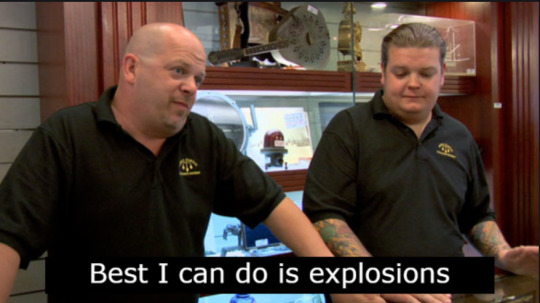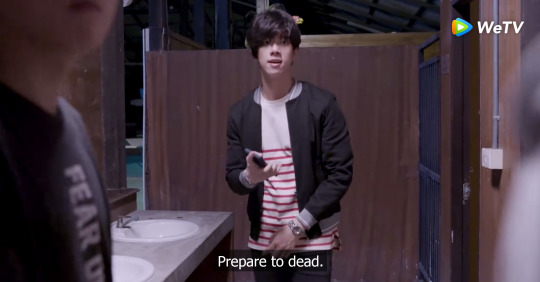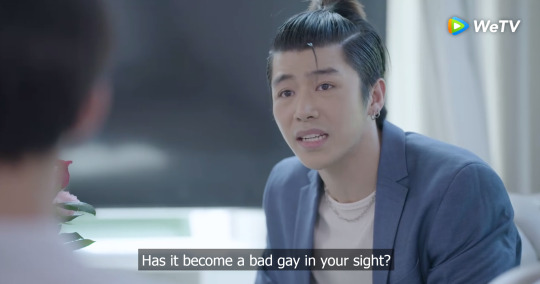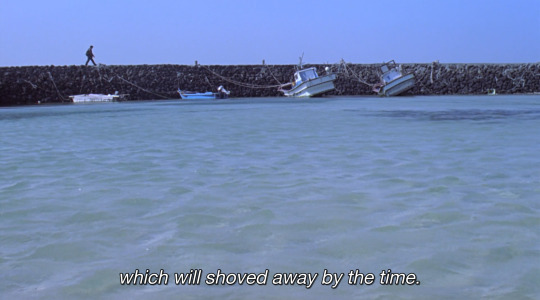#bad subtitles
Text
Me: Hey film studios can I have some light in these scenes?
Film studios:

Me: Hey can I have some subtitles?
Film studios:

Me: Hey can I have some actual sound?
Film studios:

[id in alt text]
32K notes
·
View notes
Text



I love bad subtitles so much, y'all. @absolutebl Has it become a bad gay in your sight is gonna be my new go to line for whenever the couple fights for absolutely no reason.
#love syndrome#love syndome III#Love Syndrome III#bl drama#bl series#thai bl#thai drama#thaibl#thai series#asianlgbtqdramas#asian lgbtq dramas#bad subtitles#they make me so happy#ql drama#ql series#thai bl series#thai ql#has he become a bad gay in your sight#prepare to dead#i love these subs so much#finghting is also glorious
208 notes
·
View notes
Text
Memory
I remember watching one of the Kalos League episodes in Japanese. Since the episode just aired, the only english subtitles available were really bad ones.
In this episode (I believe it was Ash/Satoshi vs. Sawyer/Shota), everyone's surprised by Hawlucha wearing a fancy outfit when sent out, and a flashback was shown on how he got the outfit. He went up to Serena holding a cloth, and the subtitles showed up as, "I was thinking..." as he wore the cloth like a cape (indicating that he wanted her to make him an outfit).
Mind you, he just said his cry.

The flashback ends, and it cuts to Hawlucha strutting a pose and shouting a battle cry, which the subtitles translate as, "For Mexico!" I stopped watching that translation.
48 notes
·
View notes
Text

I mean, I'm down with this. I want to watch both versions of the movies.
7 notes
·
View notes
Text

Mango TV terrible cdrama subs never disappoint.
It is Not over 9000 it seems.

3 notes
·
View notes
Text
I'm sorry, don't what now???

7 notes
·
View notes
Text
I'm trying to watch my beautiful man:eternal and these AI generated subtitles are straight ass bro
6 notes
·
View notes
Text

Oh shit, Infernape 2 has dropped
14 notes
·
View notes
Text
The Subtitles for PnF on Disney+ are trash
IDK what the issue is, but in "Suddenly Suzy," instead of "regular gum" the subtitles had "weiner gum."
Also, in "It's a Mud, Mud, Mud, Mud World," it says that Candace is "out for a long."
2 notes
·
View notes
Text

Now, I'm just guessing here, but something seems off about the subtitles of this drama set in 1700s China.
5 notes
·
View notes
Text

It says portfolio, in English, so the English subtitle says Post Follow because that is the only way to make this make any sense.
25 notes
·
View notes
Text

More autogenerated subtitles, this time for the trailer for Caveman (1981)


1 note
·
View note
Text




I very much enjoyed Il Mare, the Korean original of The Lake House, in spite of these slightly flawed subtitles.
The two leads may not be Keanu and Sandra but they are of course terribly pretty, as you would expect.
#il mare#il mare 2000#korean cinema#the lake house#the lake house 2006#bad subtitles#keanu reeves#sandra bullock#lee jung-jae#jun ji-hyun
1 note
·
View note
Text
Every now and then I think about how subtitles (or dubs), and thus translation choices, shape our perception of the media we consume. It's so interesting. I'd wager anyone who speaks two (or more) languages knows the feeling of "yeah, that's what it literally translates to, but that's not what it means" or has answered a question like "how do you say _____ in (language)?" with "you don't, it's just … not a thing, we don't say that."
I've had my fair share of "[SHIP] are [married/soulmates/fated/FANCY TERM], it's text!" "[CHARACTER A] calls [CHARACTER B] [ENDEARMENT/NICKNAME], it's text!" and every time. Every time I'm just like. Do they though. Is it though. And a lot of the time, this means seeking out alternative translations, or translation meta from fluent or native speakers, or sometimes from language learners of the language the piece of media is originally in.
Why does it matter? Maybe it doesn't. To lots of people, it doesn't. People have different interests and priorities in fiction and the way they interact with it. It's great. It matters to me because back in the early 2000s, I had dial-up internet. Video or audio media that wasn't available through my local library very much wasn't available, but fanfiction was. So I started to read English language Gundam Wing fanfic before I ever had a chance to watch the show.
When I did get around to watching Gundam Wing, it was the original Japanese dub. Some of the characters were almost unrecognisable to me, and first I doubted my Japanese language ability, then, after checking some bits with friends, I wondered why even my favourite writers, writers I knew to be consistent in other things, had made these characters seem so different … until I had the chance to watch the US-English dub a few years later. Going by that adaptation, the characterisation from all those stories suddenly made a lot more sense. And the thing is, that interpretation is also valid! They just took it a direction that was a larger leap for me to make.
Loose adaptations and very free translations have become less frequent since, or maybe my taste just hasn't led me their way, but the issue at the core is still a thing: Supernatural fandom got different nuances of endings for their show depending on the language they watched it in. CQL and MDZS fandom and the never-ending discussions about 知己 vs soulmate vs Other Options. A subset of VLD fans looking at a specific clip in all the different languages to see what was being said/implied in which dub, and how different translators interpreted the same English original line. The list is pretty much endless.
And that's … idk if it's fine, but it's what happens! A lot of the time, concepts -- expressed in language -- don't translate 1:1. The larger the cultural gap, the larger the gaps between the way concepts are expressed or understood also tend to be. Other times, there is a literal translation that works but isn't very idiomatic because there's a register mismatch or worse.
And that's even before cultural assumptions come in.
It's normal to have those. It's also important to remember that things like "thanks I hate it" as a sentiment of praise/affection, while the words translate literally quite easily, emphatically isn't easy to translate in the sense anglophone internet users the phrase.
Every translation is, at some level, a transformative work. Sometimes expressions or concepts or even single words simply don't have an exact equivalent in the target language and need to be interpreted at the translator's discretion, especially when going from a high-context/listener-responsible source language to a low-context/speaker-responsible target language (where high-context/listener responsible roughly means a large amount of contextual information can be omitted by the speaker because it's the listener's responsibility to infer it and ask for clarification if needed, and low-context/speaker-responsible roughly means a lot of information needs to be codified in speech, i.e. the speaker is responsible for providing sufficiently explicit context and will be blamed if it's lacking).
Is this a mouse or a rat? Guess based on context clues! High-context languages can and frequently do omit entire parts of speech that lower-context/speaker-responsible languages like English regard as essential, such as the grammatical subject of a sentence: the equivalent of "Go?" - "Go." does largely the same amount of heavy lifting as "is he/she/it/are you/they/we going?" - "yes, I am/he/she/it is/we/you/they are" in several listener-responsible languages, but tends to seem clumsy or incomplete in more speaker-responsible ones. This does NOT mean the listener-responsible language is clumsy. It's arguably more efficient! And reversely, saying "Are you going?" - "I am (going)" might seem unnecessarily convoluted and clumsy in a listener-responsible language. All depending on context.
This gets tricky both when the ambiguity of the missing subject of the sentence is clearly important (is speaker A asking "are you going" or "is she going"? wait until next chapter and find out!) AND when it's important that the translator assign an explicit subject in order for the sentence to make sense in the target language. For our example, depending on context, something like "are we all going?" - "yes" or "they going, too?" might work. Context!
As a consequence of this, sometimes, translation adds things – we gain things in translation, so to speak. Sometimes, it's because the target language needs the extra information (like the subject in the examples above), sometimes it's because the target language actually differentiates between mouse and rat even though the source language doesn't. However, because in most cases translators don't have access to the original authors, or even the original authors' agencies to ask for clarification (and in most cases wouldn't get paid for the time to put in this extra work even if they did), this kind of addition is almost always an interpretation. Sometimes made with a lot of certainty, sometimes it's more of a "fuck it, I've got to put something and hope it doesn't get proven wrong next episode/chapter/ten seasons down" (especially fun when you're working on a series that's in progress).
For the vast majority of cases, several translations are valid. Some may be more far-fetched than others, and there'll always be subjectivity to whether something was translated effectively, what "effectively" even means …
ANYWAY. I think my point is … how interesting, how cool is it that engaging with media in multiple languages will always yield multiple, often equally valid but just sliiiiightly different versions of that piece of media? And that I'd love more conversations about how, the second we (as folks who don't speak the material's original language) start picking the subtitle or dub wording apart for meta, we're basically working from a secondary source, and if we're doing due diligence, to which extent do we need to check there's nothing substantial being (literally) lost -- or added! -- in translation?
#translation#linguistics (sorta)#I love language so much#long post#subtitling#dubbing#transformative work#if you read all the way to the end - THANK YOU I am so impressed#localisation#this is not an academic essay but I still feel bad for not citing sources#low vs high context cultures and languages are concepts from intercultural communication studies#but idk how up to date that is or whether folks even still actually use them#I know they oversimplify things#but it helped me say what I was trying to here so shrug#languages#language soup#meta#language meta#fandom meta of sorts#thanks for the help sorting this out kayla <3#my nonsense
1K notes
·
View notes
Text
interesting lore moment with the francophone yesterday (as in, it personally gave me brainworms) ft. qétoiles’ horrible, no good, stupid (lack of) self-preservation . subs in English, transcript below the cut
All spoken in French — translated into English subtitles
[Video transcript:
Etoiles: And, actually, I have a theory. Basically what happened is that I’ve just returned from a mission from Cucurucho.
Antoine: And what was the mission?
Etoiles: To do a dungeon, and to recover something from the dungeon.
Antoine: And what was this “something”?
Etoiles: And the “something” was a book that sorta says that I’m a test subject.
Antoine: A test subject?!
Baghera: What’s up with your arm? You’ve got a coded arm.
Etoiles: Uh, it’s from holding the shield, basically.
Baghera: Ahhh
(Pause)
Antoine: Watch out that it doesn’t contaminate you, or else you’ll turn into a code, man.
Etoiles: That’s impossible, man, I can’t be a code.
Antoine: That’s what the old codes said before becoming codes, you know.
Etoiles: No— well, we’ve never spoken.
Baghera: Maybe you shouldn’t be using the shield as much then, no?
Etoiles: Well, as it stands, I’ve been using it for a really long time, and my mind is still healthy, honestly. And the proof is—
Baghera: Well, half of his face took the brunt of it instead.
Etoiles: Yeah, but it’s not all there is, you know.
(Pause)
Baghera: Let me worry, Etoiles, right now.
Etoiles: You’re right. You’re right! But everything’s going well, I’m doing very, very well—
Antoine: It’s true that you look a bit sick.
Etoiles: Uh, yeah, for the past seven years, it’s a chronic illness, it happened—
Antoine: No, but not this one, the other— you seem even sicker, still.
Etoiles: Yeah, okay. Yeah but no, I’m fine. No, no, it’s fine, honestly.
End Video Transcript.]
#qsmp#etoiles#baghera jones#antoine daniel#étoiles#here’s a game see if u can spot the colour coded subtitle i fucked up#sorry if the editing is bad im trying my Best .#jay rambles#jay clips#ccetoiles going ‘hey it could be fun if i played a code’ looms ominously in the background#also shoutout to people who often do translations like these fr fr#this one wasn’t too hard 4 me (fluent in both langs) but it can be difficult to translate#the implicit meanings in certain sayings between languages#i took the liberty of translating the little affirmative ‘quoi’s at the end of sentences#as ‘honestly’s and ‘you know’s since there’s no real equivalent#21/09/2023
699 notes
·
View notes
